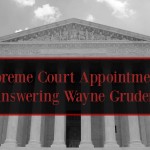New Testament Standards for Church Leaders
Insofar as church leaders are required to have a mature understanding of doctrine and the capacity to teach the Word, it should be self-evident that these are not essential prerequisites for political leaders. However, the character standards required for such leaders deserve consideration. Unless the context is clearly limited to church leadership, character requirements for church leaders—who are servants of God—are presumptively applicable for “governors”—who are also called servants of God. 1 Peter 3.
1 Timothy 3 gives us several character standards for choosing a church elder. He must be:
- Above reproach
- The husband of one wife.
- Sober-minded.
- Self-controlled.
- Respectable.
- Hospitable.
- Not violent but gentle.
- Not quarrelsome.
- Not a lover of money.
- Manage his own household well.
No one is without sin, so “above reproach” obviously doesn’t mean sinless. If we take the list as a whole, leadership requires a kind of moral steadiness that arises from a man who lives a decent and honorable life.
The requirements for a deacon—whose job it was to deal with the details of daily life such as taking care of the food for widows—not spiritual leadership—are also instructive. 1 Timothy 3 says that deacons are to be: 1. Dignified 2. Not double-tongued. 3. Not addicted to much wine. 4. Not greedy for dishonest gain. In Acts 6, deacons were required to be “men of good repute, full of the Spirit and wisdom.” Political leaders should at least be men of good repute and have wisdom as it relates to governance.
Importantly, deacons are also “to be tested first.” This is echoed by the command in 1 Timothy 5:22 to “lay hands suddenly on no man.” The idea is that people should have proven themselves over time before being trusted with leadership. If this is true for deacons who wait on tables and furnish meals, then it is surely a good principle for picking the highest leader of a nation.
Samuel Adams explained the general view of the founding generation on the moral and character requirements for leadership. Adams talks directly to the voters about the standards they should follow in making their choice.
He therefore is the truest friend to the liberty of his country who tries most to promote its virtue, and who, so far as his power and influence extend, will not suffer a man to be chosen into any office of power and trust who is not a wise and virtuous man. We must not conclude merely upon a man’s haranguing upon liberty, and using the charming sound, that he is fit to be trusted with the liberties of his country….
The sum of all is, if we would most truly enjoy this gift of Heaven, let us become a virtuous people.
While the writings of the founders are not necessarily the equivalent of a biblical worldview, such passages provide us with a checkpoint to ensure that we properly distinguish between the requirements for church leadership and civic leadership.
I would respectfully suggest that the biblical standards for church leadership give us a fuller understanding of the requirements of being “wise and virtuous,” but I believe that Sam Adams’ condensed phrasing of the standard is an appropriate bare minimum for entrusting a person with the reins of government.
In addition, there are certain kinds of character flaws that we are told to avoid.
“Do not make friends with a hot-tempered person, do not associate with one easily angered.” Proverbs 22:24.
“The arrogant cannot stand
in your presence.
You hate all who do wrong;
you destroy those who tell lies.
The bloodthirsty and deceitful
you, Lord, detest.”
Just as the good qualities can perhaps be summarized as wise and virtuous, the disqualifying kinds of character flaws would seem to include: those who are hot-tempered, arrogant, habitual liars, blood-thirsty, or deceitful.
What do we do with all this information? Click to continue…






